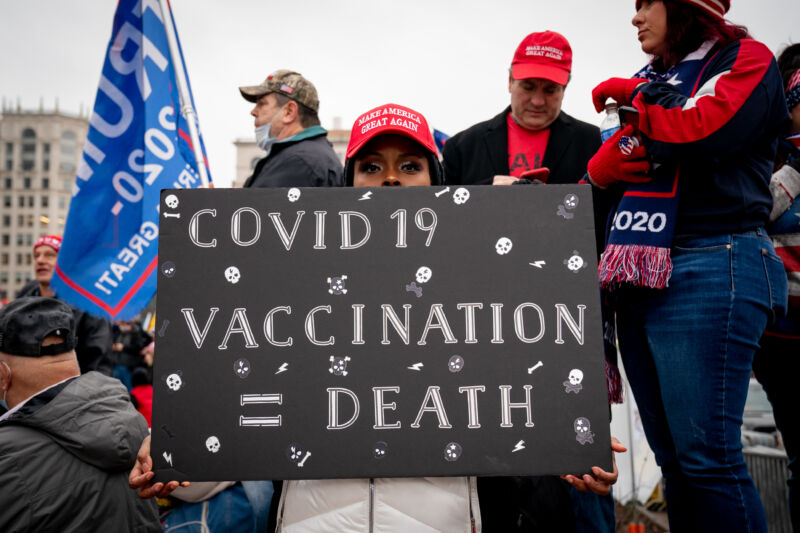
While the Biden administration anticipates having enough COVID-19 vaccine doses to vaccinate all adults by May 1, health experts and policy advisers are trying to figure out how to actually get those shots into the arms of people—particularly people who are hesitant or distrustful of the vaccines, many of whom are Republicans.
For most of the country—about 69 percent—getting vaccinated and being able to return to some normal activities is an easy sell. Over 21 percent of people in America have already gotten at least one dose of an authorized vaccine. Three vaccines are currently authorized for use in the US, all of which are highly effective and safe. For the remaining pro-vaccine people, it’s just a matter of time before they can get one. In fact, many people around the country are anxiously trying to get in line and scouring online sign-up websites for an open vaccination slot.
But about 30 percent of adults are not getting in line, according to a poll by the Pew Research Center reported March 5. About 15 percent of people said they would probably not get vaccinated and an additional 15 percent said they would definitely not get a shot. That’s enough people to dash any hopes of ending the pandemic through vaccination. It’s also enough to ruin the Biden administration’s plans of celebrating our independence from the virus on July 4.
There are a number of reasons why people are eschewing their shot, but many of them are highly correlated with political leanings. In the Pew poll, for instance, Democrats were 27 percentage points more likely than Republicans to say they would get or have already gotten a COVID-19 vaccine.
The same disparity has been seen in other polls. A poll published February 26 by the Kaiser Family Foundation—a nonprofit focusing on national health issues—found that a whooping 28 percent of Republicans said they would “definitely not” get a COVID-19 vaccine, while just 2 percent of Democrats said that.
Sway
A NPR/PBS NewsHour/Marist survey released March 12 found the same thing. When asked, “If a vaccine for the coronavirus is made available to you, will you choose to be vaccinated?” the two groups most likely to respond “no” were Republican men (49 percent said they would say no) and people who supported then-President Donald Trump in 2020 (47 percent responded that they would decline). Notably, the survey also found little difference between Black and white people when it came to turning down a dose. About 28 percent of white people said they would decline a shot, while 25 percent of Black people said the same.
In a 20-person focus group of Trump voters held this weekend, GOP pollster Frank Luntz worked to figure out how to crack the partisan barrier to vaccination. “These people represent 30 million Americans,” Luntz told The Washington Post. “And without these people, you’re not getting herd immunity.”
After the two-hour session, 19 participants (one person dropped out) said they were more likely to get vaccinated. What worked to change their mind was straight and honest facts about the vaccines—such as that an overwhelming number of doctors have chosen to get vaccinated and that the long-term health effects of COVID-19 could be much worse than vaccine side effects. The participants also appreciated hearing points such as, that, although the mRNA vaccines were developed and tested at “warp speed,” the underlying research for the vaccines have been in the works for decades. Also, although experts consider the vaccine safe, there’s no way to know long-term risks.
“We want to be educated, not indoctrinated,” one participant said.
What absolutely didn’t work was political-based appeals or appeals by politicians. The members of the focus group were annoyed by a video advertisement promoting the vaccines that included former presidents Barack Obama, George W. Bush, Bill Clinton, and Jimmy Carter. They also, surprisingly, said they wouldn’t be swayed by an appeal from Trump himself. Luntz speculated to the Post afterward that perhaps “people are beginning to move on.”
Trusted voices
One politician did seem to have some sway, however: former New Jersey Governor Chris Christie. The focus group was moved by Christie talking about his own struggle with COVID-19 (which landed him in the intensive care unit for a week) and how he lost two family members to the virus. He emphasized that he trusted vaccines based on his experience with COVID-19 and the information he had learned about the vaccines themselves.
Otherwise, the Trump backers said they wanted to hear more from trusted sources in their lives, such as doctors, rather than celebrities or politicians. That squares with what health researchers who have studied vaccine hesitancy have found. And the Biden administration already seems clued in to this point.
In a recent press briefing, Marcella Nunez-Smith, a Yale researcher who is advising Biden on health equity, spoke about the administration’s efforts to boost vaccination. “We’re building relationships with trusted messengers, all over the country, to make sure they have the best information possible to share with their communities,” she said.
According to a report by Stat, the administration is spending $1.5 billion on a public relations campaign aimed at people who are hesitant or resistant to getting a COVID-19 vaccine. The campaign will reportedly include radio, television, and digital advertising and will launch in the coming weeks.
reader comments
700